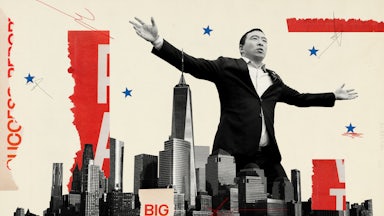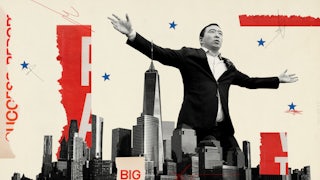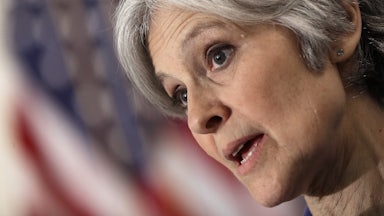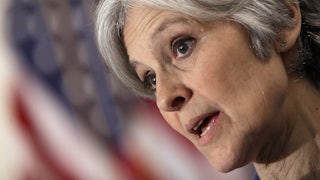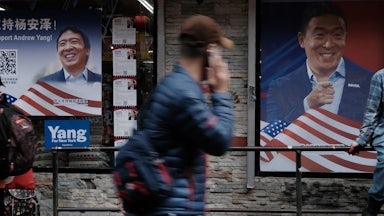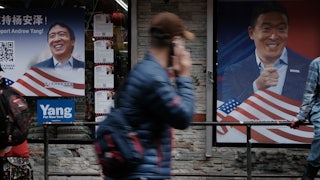Andrew Yang is not actually interested in politics. He’s interested in “thought leadership.” These ideas have some overlap and are easy to confuse, but in Yang’s case, the differences come shining through. A key tell: He doesn’t appear to have thought much about governance, legislation, or power; according to a May profile in The Nation, he was completely unacquainted with basic policy issues. What he does appear to want is to be regarded as interesting—the type of person sought out to speak on panels at big ticket events with heavy-hitting corporate sponsors, or capable of negotiating a vanity credit as “co-producer” on a Hulu documentary.
Like many others who plotted a path from cable news green room to Ideas Festival, Yang realized that electoral campaigns come surrounded by cameras and tastemakers: His long-shot run for president in 2020 and less-long-shot-but-still-very-doomed run for Mayor of New York City shortly thereafter were less about seeking and winning public office and more about brand-building, a goal he has arguably fulfilled.
With all of this in mind, it almost feels silly to weigh in on the merits of Yang’s latest political stunt: his announcement—anticipated by what I suspect were strategic buzz-generating press leaks—that he’s left the Democratic Party he’d barely joined to found something he’s calling the “Forward Party.” This proclamation just happened to coincide with the release of his new book, Forward: Notes on the Future of Our Democracy, which he’s now touring across the country to promote.
The oddball following that Yang cultivated throughout 2019 eventually threw millions behind his candidacies, and his fans are now expected to pony up some tall dollars to attend his launch event, where they’ll dutifully nod along as he rightfully insists that neither major party truly represents the American people and that there’s something deeply wrong with our politics. That Yang has no idea what that is or how to fix it hardly matters at this point: This is not about solving problems, it’s about projecting attitudes. Those outside his coterie of marks can simply take heart in the fact that the Forward Party is fake.
In fairness to those who desire some sort of alternative to a political system that’s not really working anymore, it’s not difficult to understand why a hypothetical viable third (or fourth or fifth!) party might be desirous, or even valuable: Leftists, in particular, frequently debate strategies toward the creation of a robust labor party sustained by member dues rather than corporate patronage, which would hold candidates accountable for championing a democratically settled agenda centered on workers.
It probably won’t surprise you to learn this is not exactly what Yang has in mind: While proponents of an eventual independent labor party envision it as an electoral vehicle for their favored political program of social democracy, Yang insists, “I’m not very ideological. I’m practical.” Forward’s five-pronged working platform, as outlined in an explanatory video, includes open primaries and voting, a Universal Basic Income, a “human-centered economy,” “modern and effective government,” and “grace and tolerance.” This is perhaps your second clue about Yang’s overall seriousness: the fact that this platform is about 60 percent buzzword.
Still, in for a penny, in for a pound, so let’s do this: Electoral reforms to ease obstacles for third parties are straightforwardly good ideas—though forming a party to campaign for them is a bit like setting up a lemonade stand to raise money to buy lemonade. And while one could certainly imagine compelling left-wing versions of a UBI that work to untether wage labor from income and inscribe material security as a social right, Yang’s tech-friendly version feels more like a meager consolation pittance to soften the blow of being elbowed out of the productive economy.
As for the other three “ideas,” these aren’t so much “innovations” as they are “nebulous platitudes” that no one could possibly object to—or in some cases (“human-centered economy”?) even define. They’re vague enough that I’m not sure what they even mean, let alone how, exactly, the two-party system is currently impeding them from existing.
All of which raises the question: Why bother going through the trouble of building a third party if its creation is the only thing it intends to accomplish? Yang centers his critique of the two-party system on the fact that “polarization is getting worse than ever.” Here, he’s half right: Swing voters are going extinct, voters who once might have split their tickets between Republicans and Democrats are now much less likely to do so, bipartisanship is in retreat, and broad swaths of the electorate no longer really identify with either side.
But Yang’s analysis is missing a few critical elements. Polarization has been largely asymmetrical—that is, over the past several decades, the Republican Party has lurched further and further rightward, while Democrats have, until relatively recently, mostly stayed put or shifted slightly rightward as well. And while Republicans are ideologically unified in service of capital, Democrats are a jumbled coalition of disparate interests in which capital is the senior member, dismayingly often trumping the will of all others.
In other words, the real problem with today’s two-party system is less that the parties are too polarized and more that they’re too similar. They’re both utterly captured by monied interests, lack an organized base capable of forcing downward redistribution, and, yes, have a vested interest in maintaining a chokehold around the structural reasons the two-party duopoly has persisted since the mid-nineteenth century—including some of the laws Yang rightfully wishes to change.
The root problem in American life and politics is the same problem with the two-party system: namely, that too few people control too much money, while too many people suffer as a result. Those who are clear-eyed about this have every reason to harbor disdain for the Democratic Party, even as they disagree on solutions.
One way of thinking about the insurgent progressive electoral movement is as a project to reduce or eliminate the power of the ultrarich within the Democratic Party’s coalition, thereby remaking it into a more ideological apparatus to mirror the GOP. For leftists who see the limitations of that idea and are skeptical that capital’s veto within the Democratic Party can ever be overcome, there are a few basic options: They could reject electoral politics altogether and advance their political goals in other settings, such as workplaces. Or they could build a powerful flank within the Democratic Party for the time being, until it’s strong enough to split off on its own (the so-called “dirty break” strategy coined by organizer and author Eric Blanc).
Or progressives could build the infrastructure for a third party before it successfully cultivates a base of voters for that project, thereby wasting a lot of valuable energy and resources in a never-ending struggle to gain ballot access for voters who’ve not yet bought in to the project—an effort that typically amounts to little more than a futile political exercise for cranks. (This has long been the strategy of the Green Party, which, to its credit, has taught us that If You Build It and Build It and Build It and Then Do Nothing Else, They Won’t Come.)
It is this latter example—an endless process of lining up an infinite number of carts in front of an infinite number of horses—that seems closest to what Yang now suddenly says he wants to do. Still, whatever you say about the Green Party, its stated political goals are better defined, and no one doubts the beneficent intentions of its proponents.
But Yang, whose motivations seem simply to spring from the fact that his two hastily thrown together stunt campaigns haven’t provided him with instant gratification, has chosen a fourth option: Not only would he put those carts before those horses by starting a new party before cultivating any voters beyond his online die-hards, he’d do so in the service of finding a nonsolution to a nonproblem. If Yang is looking for a way to express nominally liberal, pro-business politics in the U.S., I have very good news for him: The Democratic Party exists. But I suspect that Yang isn’t really doing any of this to change politics. He’s doing it to move his book into and out of the airport bookstores he breezes past as he flits from Aspen to Davos to D.C.

